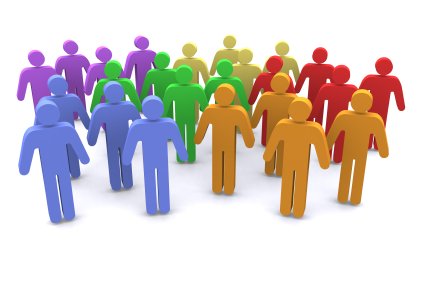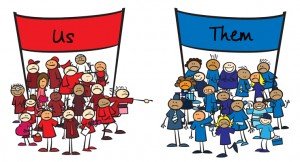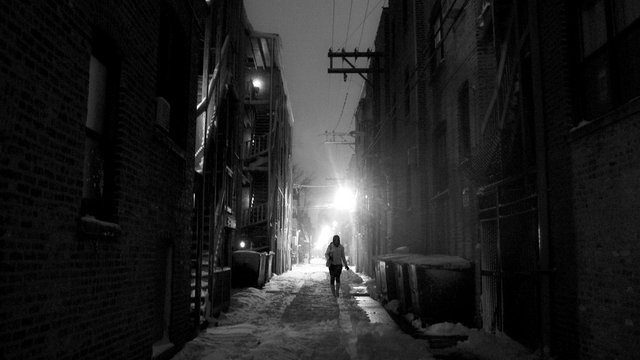Are We All Bigots?
The Story:
We all have biases no matter how open-minded we think we are. If you claim that you see everyone as equal, you are lying to yourself. At first I didn’t want to admit this. However, a simple walk to the park on a Saturday afternoon convinced me that our judgment for others is shaped based on stereotypes. The first hint came while I was walking towards the park. I could see various billboards with messages from different political parties asking for people to trust “Them” instead of “The Others”. I also stumbled across some newspapers which were discussing about the clash between rich and poor. It did not take me long to get to the park. On my arrival I saw a group of people playing a soccer game. I could easily distinguish the two teams from each other because they were wearing two different colours: blue and red. It did not take long until they started fighting each other on who was cheating and who wasn’t. Even though they were getting along at start, each player’s judgment was biased from the colour of the shirt he was wearing. The blue player would support his own team while the red would do the same for his own. It didn’t matter who was wrong or right!
I quickly got bored from their argument and decided to look for a bench to sit. There were two of them. The one bench had two old men while the other had a beautiful young woman. I preferred the bench with the beautiful young lady because I feel more familiar with people of my own age. She let me sit beside her while she smiled at me. We had a brief exchange of greetings and we carried on reading our books. Soon, a man with a darker skin colour came to sit near the bench. I could see that the woman did not greet him in the same way she did with me. As that was not enough, she kept throwing scared glances towards him. It did not take me long enough to understand that the woman felt uncomfortable sitting next to that man. My judgement was proven correct from the fact that the woman left the bench and sat near the one with the old men. How unkind, I thought. I tried to talk to the man however he could not understand me. The only thing he managed to say was “I no speak English”. For some reason that made me feel a bit awkward. It didn’t bother me in a bad way but it crossed my mind that I would have felt more comfortable with a person who spoke a language familiar to me. An hour had passed and I decided to leave the park and go for a cup of coffee. At the exit of the park I could see many people grouped in various large groups. Each of the groups had someone who was preaching. I noticed that one of them was preaching about Christianism and another for Islam. In each group, there was always that one person who tried to disprove what the preacher was saying. The groups were not fractionated only by religion. Other groups included Capitalism and Socialism as their topics. Finally, I left the park. I decided to call a friend to join me for a coffee. Even though I have many friends I decided to call Mark becaused he preferred the same coffeeshop with me, Starbucks.
What can you see?
The story above is fictional. However, I am sure that many have stumbled upon similar experiences. In the above story we can identify various forms of discrimination:
- By race/colour.
- By political ideology.
- By gender.
- By age.
- By religion.
- By sports team.
- Even by brand of coffee!!!
The list could go on, however, nobody can deny that we live in a society fractionated by all the above. We divide ourselves into rival tribes and that division grows stronger though each passing year. When did hate become hardwired into our brain? Are we all borned to discriminate against our own species? Are we all bigots?
Studies suggest that we are all bigots.
Some people gain our trust almost instantly as we meet them, whereas others are immediately hardwired as non-trustworthy. Have you ever thought about who you instinctively trust or fear? Imagine yourself walking down a dark creepy alley. You can see someone walking towards you holding something. However, it is not clear what he is holding. Many will assume that the person is carrying a gun or some kind of weapon. Can you trust that person? If not what makes you not trust them? You don't know them! I like to think of myself as an open minded person. However scientists are telling me that I am lying to myself... and so are YOU! We all look at the world with caution and when we only have a split second to chose your own judgment may shock you.
According to this study, people may be influenced by stereotypes when it comes to deciding whether to shoot a person to defend themselves. This hypothesis was tested through a simulation. The method they used was designed in a way to test whether the participants would base their decisions on what they had just read in some articles (more information can be found in the study). The participants were asked to treat the simulation as it was a real case scenario. A potential lethal person is about to confront him and he will have less than one second to make a decision. The experiment goes as follows:The subject will see a scene appear in front of him downrange. Then, a white man will appear holding either a cellphone or a gun, OR a black man will appear holding either a cellphone or a gun. The image of the black or white man is on the screen only for a second and the subjects need to make a decision, shoot or hold fire. Mistake the gun for a phone and die? Or mistake the phone for a gun and take a life of an innocent person? During the experiment black and white people appear evenly on the screen. The study does not only record whether the subjects made the wrong or right decision, but it also times the decision to see how long it took the participants to make up their mind. The participants perform well and do not make many mistakes. However, when they do make mistakes the study shows that the errors contain racial biases. They are faster to shoot the armed target if his black rather than white. Even when the subject is unarmed and is holding a cellphone, the subjects are more likely to mistakenly shoot someone if he is black rather than white. On average, white subjects are quicker to shoot the black male and are 30 % - 40% more like to mistake his phone with a gun. The study also suggests that training is likely to reduce these kind of mistakes but no matter the training most participants are quicker to shoot at a black target. So are white people inherently racists against black people? The study shows otherwise. Even black participants are more likely to shot a BLACK person rather than a WHITE one! In other words black participants show the same antiblack bias that white participants do. The study suggest that this represents a cultural stereotype. This does not mean that the participants believe that black men are more dangerous than white men. However, it demonstrates that the movies people watch, the songs they listen and the news reports link this idea to their brain regardless if the participants agree or not with the stereotype. The brain is influenced by the media and regardless of race, black males are subconsciously considered dangerous.SO... We make life and death decisions based on stereotypes we don't even believe. Many people believe that we can overcome these bigoted ideas. However, a neuroscientist called Jonathan Freeman and his team suggest that racial stereotypes take over our subconscious mind and we carry these stereotypes in our mind wherever we go. When we first see a person's face our subconscious mind perceives them as a stereotype of their race, gender, age or sexual orientation. For example, when we first see an Asian student our mind might register her as the Asian overachiever. That might happen only for a second or until we actually get to know the person better. Consequently, even if we know that we are wrong, our mind subconsciously visits a vault which is stored in our memory. That vault includes all the stereotypes we have experience in our life either through the media or other ways. Our mind then tries to compare the individual we are meeting for the first time with past experiences. This is why we all are biased!
Some final thoughts:
There are many experiments that suggest that we or bigots. They are worth exploring but I do not have the time to analyse them all here.I strongly believe that we all are bigots even if we like it or not. It is not something that we should feel ashamed of. It is our factory settings and it is hardcoded to our brain. The reason we developed bigotry as humans was to be able to categorise scenarios in groups in order to survive. However, I am sure that the majority of people including myself are trying to control this function of our brain in order to reduce the harmful implications it may have. Nevertheless, it is important to understand that bigotry can never be absent from our brain completely. For anyone that claims that they are not bigots I only need to ask the following question in order to change their mind " Why did you chose your love ones over others?"


